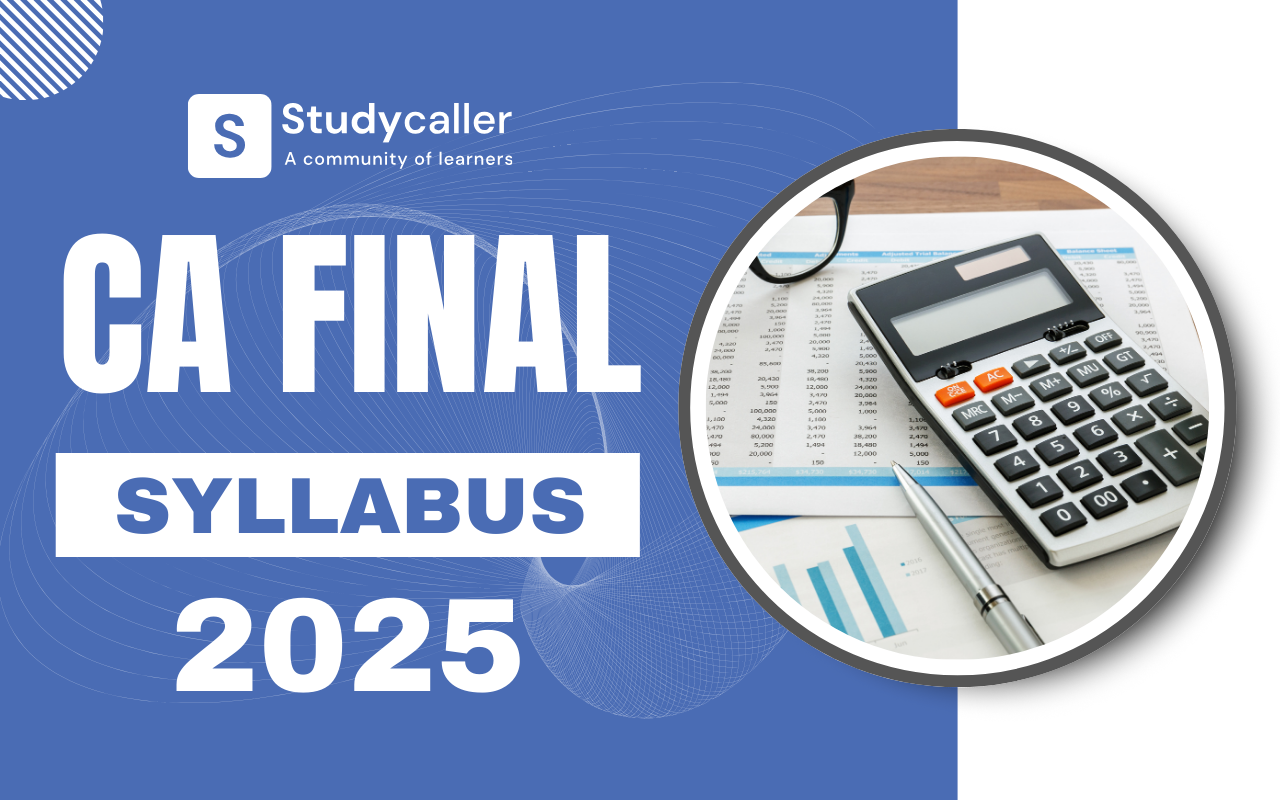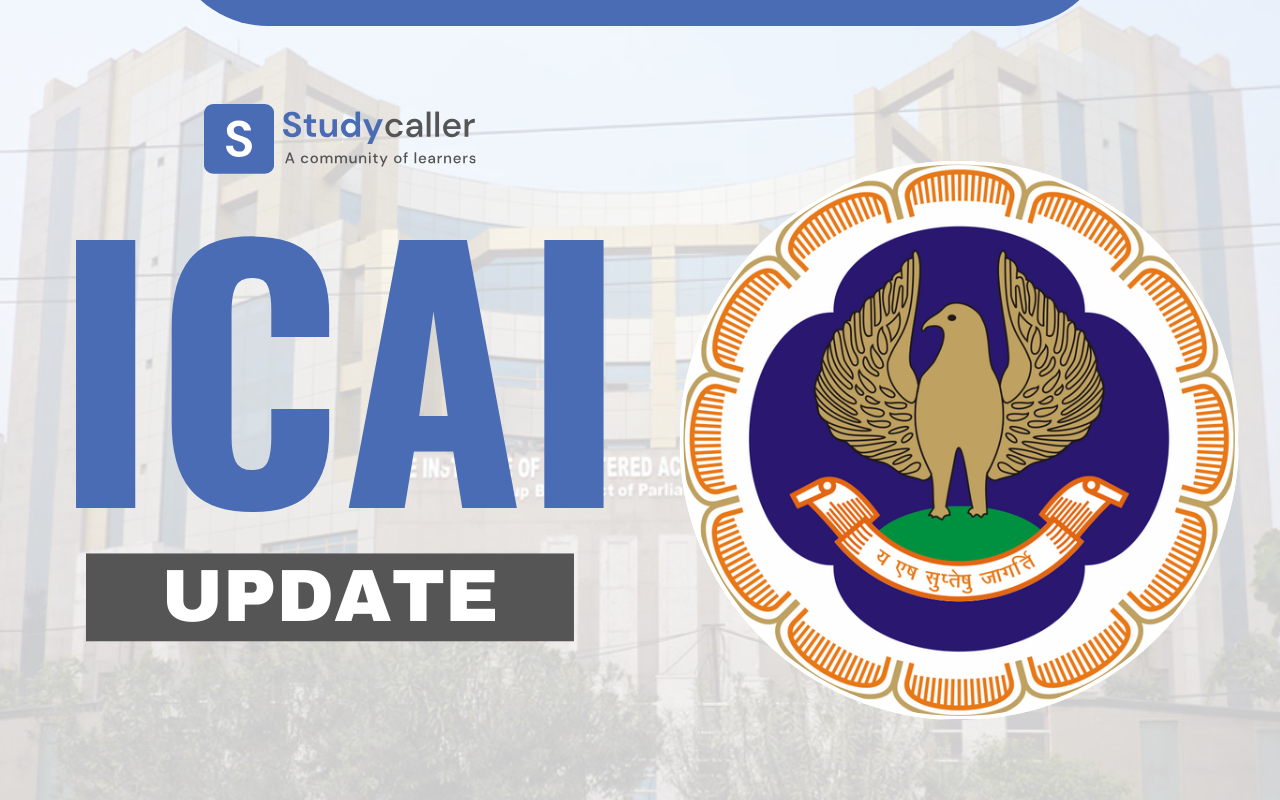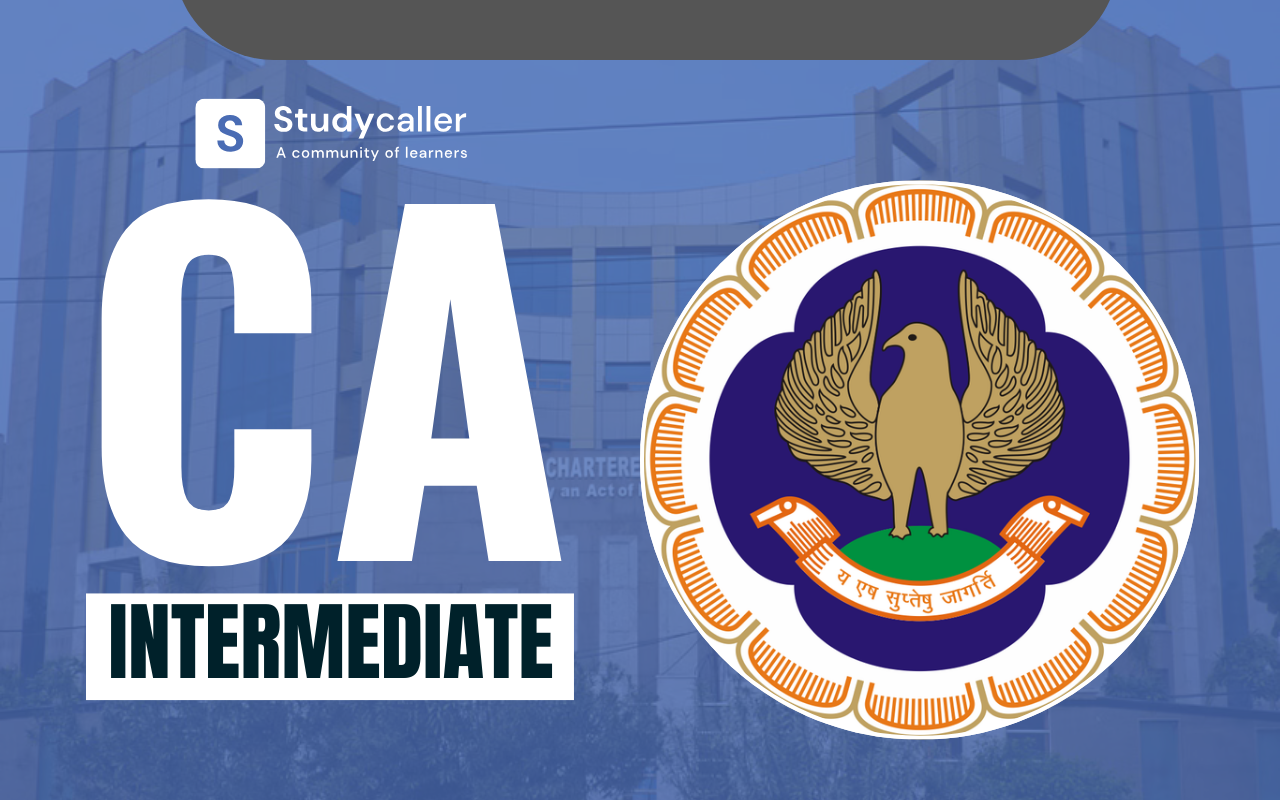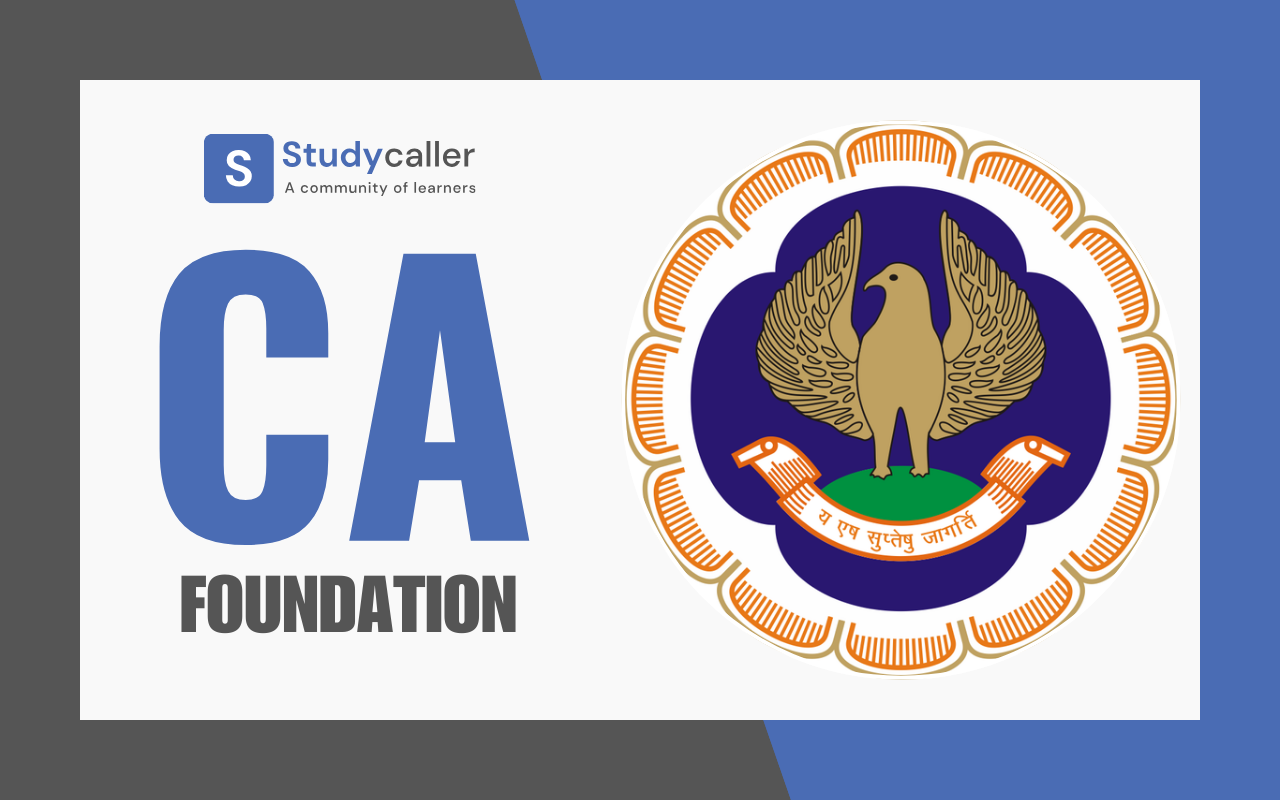CA Final Syllabus May 2026: Complete Subjects-wise Updates by ICAI
Get a clear overview of the CA Final syllabus May 2026, including subjects, exam pattern, and important areas to focus on. Read the full article to uplift your preparation.


Table of Content
The Institute of Chartered Accountants of India (ICAI) has established the ICAI CA syllabus 2026. The CA Final syllabus May 2026 covers a wide range of subjects, including company law, auditing, and taxes. To be a certified chartered accountant, candidates are required to pass all papers of both groups of the CA Final examination.
Whereas the syllabus for all CA course levels is large and difficult, the syllabus of the CA Final is deemed most strenuous. The exam usually gets cleared by the candidates on 3-4 attempts, and the pass ratio is very poor, about 25%.
CA Final Syllabus 2026
Students must adhere to the modified CA Final syllabus and subjects for 2026, which have been updated by ICAI. You can check the relevant page or go to the BoS Knowledge portal on the official ICAI website to view the updated curriculum and subjects for the CA Final Exams.
The six subjects that make up the ICAI CA Final Syllabus 2026 are divided into two categories. These topics include advanced auditing, company law, cost control, taxation, management, and financial reporting. In the CA Final Course, each paper is worth 100 points.
To pass the tests, students need to receive at least 40% in each topic and a total cumulative score of 50% in all CA Final subjects. One must prepare carefully, revise extensively, and finish a sufficient number of CA Final papers, including MTPs and RTPs, in order to get the best scores possible on the May 2026 tests.
Enroll Now for CA Final Courses
Highlights CA Final Syllabus May 2026
Examine the updated CA Final curriculum in accordance with the most recent ICAI scheme. It includes eight papers split into two groups that cover advanced financial reporting, strategic financial management, and other topics.
| CA Final Syllabus May 2026 | ||
| S. No. | Paper Name | Marks |
| Paper 1 | Financial Reporting | 100 Marks |
| Paper 2 | Advanced Financial Management | 100 Marks |
| Paper 3 | Advanced Auditing, Assurance And Professional Ethics | 100 Marks |
| Paper 4 | Direct Tax Laws & International Taxation | 100 Marks |
| Paper 5 | Indirect Tax Laws Part I: Goods and Services Tax Part II: Costumes & FTP |
100 Marks 80 Marks 20 Marks |
| Paper 6 | Integrated Business Solutions (Multi-Disciplinary Case Study With Strategic Management) |
100 Marks |
CA Final New Syllabus for May 2026
Six subjects make up the new CA Final syllabus under the new ICAI structure. The following is a list of the extensive topics and subtopics covered in each of the CA Final New Scheme subjects.
Paper 1: Financial Reporting
Various Indian Accounting Standards (Ind AS), financial reporting, business combinations, and the ethical obligations of chartered accountants are all covered in the syllabus for CA Final Paper 1-Financial Reporting (applicable for the May 2026 examination & forward). An organized table for the Financial Reporting course may be seen below:
| CA Final Syllabus 2026 For Financial Reporting | |||
| Module | Chapter | Topic | Units |
| Module 1 | Chapter 1 | Introduction to Indian Accounting Standards | - |
| Chapter 2 | Conceptual Framework for Financial Reporting under Ind AS | - | |
| Chapter 3 | Ind AS on Presentation of General Purpose Financial Statements | Ind AS 1, Ind AS 34, Ind AS 7 | |
| Chapter 4 | Ind AS on Measurement Based on Accounting Policies | Ind AS 8, Ind AS 10, Ind AS 113 | |
| Module 2 | Chapter 5 | Ind AS on Assets of the Financial Statements | Ind AS 2, Ind AS 16, Ind AS 23, Ind AS 36, Ind AS 38, Ind AS 40, Ind AS 105, Ind AS 116 |
| Module 3 | Chapter 6 | Ind AS on Liabilities of the Financial Statements | Ind AS 19, Ind AS 37 |
| Chapter 7 | Ind AS on Items Impacting Financial Statements | Ind AS 12, Ind AS 21 | |
| Chapter 8 | Ind AS on Disclosures in the Financial Statements | Ind AS 24, Ind AS 33, Ind AS 108 | |
| Module 4 | Chapter 9 | Ind AS 115 - Revenue from Contracts with Customers | - |
| Chapter 10 | Other Indian Accounting Standards | Ind AS 41, Ind AS 20, Ind AS 102 | |
| Chapter 11 | Accounting and Reporting of Financial Instruments | - | |
| Module 5 | Chapter 12 | Ind AS 103 - Business Combinations | - |
| Chapter 13 | Consolidated and Separate Financial Statements of Group Entities | Ind AS 110, Ind AS 111, Ind AS 28, Ind AS 27 | |
| Chapter 14 | Ind AS 101 - First-time Adoption of Ind AS | - | |
| Chapter 15 | Analysis of Financial Statements | - | |
| Chapter 16 | Professional and Ethical Duty of a Chartered Accountant | - | |
| Chapter 17 | Accounting and Technology | - | |
Paper 2: Advanced Financial Management
The second paper, Advanced Financial Management (Applicable for May 2026 Exam), covers risk management, security analysis, advanced capital budgeting decisions, and financial valuation. Below is a structured table for the Advanced Financial Management course:
| CA Final Syllabus 2026 For Advanced Financial Management | |
| Chapter No. | Topic |
| Chapter 1 | Financial Policy and Corporate Strategy |
| Chapter 2 | Risk Management |
| Chapter 3 | Advanced Capital Budgeting Decisions |
| Chapter 4 | Security Analysis |
| Chapter 5 | Security Valuation |
| Chapter 6 | Portfolio Management |
| Chapter 7 | Securitization |
| Chapter 8 | Mutual Funds |
| Chapter 9 | Derivatives Analysis and Valuation |
| Chapter 10 | Foreign Exchange Exposure and Risk Management |
| Chapter 11 | International Financial Management |
| Chapter 12 | Interest Rate Risk Management |
| Chapter 13 | Business Valuation |
| Chapter 14 | Mergers, Acquisitions and Corporate Restructuring |
| Chapter 15 | Startup Finance |
Paper 3: Advanced Auditing, Assurance And Professional Ethics
Three modules make up Advanced Auditing, Assurance, and Professional Ethics (Applicable for May 2026 Exam), which covers a variety of auditing topics, professional ethics, and auditing specialties. An organized table for the Advanced Auditing, Assurance, and Professional Ethics curriculum may be found below:
| CA Final Syllabus 2026 for Advanced Auditing, Assurance and Professional Ethics | ||
| Module | Chapter | Topic |
| Module 1 | Chapter 1 | Quality Control |
| Chapter 2 | General Auditing Principles and Auditors' Responsibilities | |
| Chapter 3 | Audit Planning, Strategy, and Execution | |
| Chapter 4 | Materiality, Risk Assessment, and Internal Control | |
| Chapter 5 | Audit Evidence | |
| Chapter 6 | Completion and Review | |
| Chapter 7 | Reporting | |
| Module 2 | Chapter 8 | Specialised Areas |
| Chapter 9 | Related Services | |
| Chapter 10 | Review of Financial Information | |
| Chapter 11 | Prospective Financial Information and Other Assurance Services | |
| Chapter 12 | Digital Auditing & Assurance | |
| Chapter 13 | Group Audits | |
| Chapter 14 | Special Features of Audit of Banks & Non-Banking Financial Companies | |
| Module 3 | Chapter 15 | Overview of Audit of Public Sector Undertakings |
| Chapter 16 | Internal Audit | |
| Chapter 17 | Due Diligence, Investigation & Forensic Accounting | |
| Chapter 18 | Sustainable Development Goals (SDG) & Environment, Social and Governance (ESG) Assurance | |
| Chapter 19 | Professional Ethics & Liabilities of Auditors | |
Paper 4: Direct Tax Laws & International Taxation
The four modules of Direct Tax Laws & International Taxation cover a variety of topics, from taxation, tax planning, international tax issues, and ethical concerns. Following is a systematic table for the Direct Tax Laws & International Taxation syllabus:
| CA Final Syllabus 2026 for Direct Tax Laws & International Taxation | ||
| Module | Chapter | Topic |
| Module 1 | Chapter 1 | Basic Concepts |
| Chapter 2 | Incomes which do not form part of Total Income | |
| Chapter 3 | Profits and Gains of Business or Profession | |
| Chapter 4 | Capital Gains | |
| Chapter 5 | Income from Other Sources | |
| Chapter 6 | Income of Other Persons included in Assessee’s Total Income | |
| Chapter 7 | Aggregation of Income, Set Off or Carry Forward of Losses | |
| Chapter 8 | Deductions from Gross Total Income | |
| Module 2 | Chapter 9 | Assessment of Various Entities |
| Chapter 10 | Assessment of Trusts and Institutions, Political Parties, and Other Special Entities | |
| Chapter 11 | Tax Planning, Tax Avoidance, and Tax Evasion | |
| Chapter 12 | Taxation of Digital Transactions | |
| Module 3 | Chapter 13 | Deduction, Collection, and Recovery of Tax |
| Chapter 14 | Income Tax Authorities | |
| Chapter 15 | Assessment Procedure | |
| Chapter 16 | Appeals and Revision | |
| Chapter 17 | Dispute Resolution | |
| Chapter 18 | Miscellaneous Provisions | |
| Chapter 19 | Provisions to Counteract Unethical Tax Practices | |
| Chapter 20 | Tax Audit and Ethical Compliances | |
| Module 4 | Chapter 21 | Non-Resident Taxation |
| Chapter 22 | Double Taxation Relief | |
| Chapter 23 | Advance Rulings | |
| Chapter 24 | Transfer Pricing | |
| Chapter 25 | Fundamentals of BEPS | |
| Chapter 26 | Application and Interpretation of Tax Treaties | |
| Chapter 27 | Overview of Model Tax Conventions | |
| Chapter 28 | Latest Developments in International Taxation | |
Paper 5: Indirect Tax Laws
The two sections of the syllabus for CA Final Paper 5: Indirect Tax Laws are Customs & Foreign Trade Policy (FTP) and Goods and Services Tax (GST). A structured table for the curriculum on indirect tax laws may be found below:
| CA Final Syllabus 2026 for Indirect Tax Laws | ||
| Module | Chapter | Topic |
| Part I: Goods and Services Tax (GST) | ||
| Module 1 | Chapter 1 | Supply under GST |
| Chapter 2 | Charge of GST | |
| Chapter 3 | Place of Supply | |
| Chapter 4 | Exemptions from GST | |
| Chapter 5 | Time of Supply | |
| Chapter 6 | Value of Supply | |
| Module 2 | Chapter 7 | Input Tax Credit |
| Chapter 8 | Registration | |
| Chapter 9 | Tax Invoice, Credit and Debit Notes | |
| Chapter 10 | Accounts and Records; E-way Bill | |
| Chapter 11 | Payment of Tax | |
| Chapter 12 | Electronic Commerce Transactions | |
| Chapter 13 | Returns | |
| Module 3 | Chapter 14 | Import and Export Under GST |
| Chapter 15 | Refunds | |
| Chapter 16 | Job Work | |
| Chapter 17 | Assessment and Audit | |
| Chapter 18 | Inspection, Search, Seizure and Arrest | |
| Chapter 19 | Demands and Recovery | |
| Chapter 20 | Liability to Pay in Certain Cases | |
| Chapter 21 | Offences and Penalties and Ethical Aspects under GST | |
| Chapter 22 | Appeals and Revision | |
| Chapter 23 | Advance Ruling | |
| Chapter 24 | Miscellaneous Provisions | |
| Part II: Customs & FTP | ||
| Module 4 | Chapter 1 | Levy of and Exemptions from Customs Duty |
| Chapter 2 | Types of Duty | |
| Chapter 3 | Classification of Imported and Export Goods | |
| Chapter 4 | Valuation under the Customs Act, 1962 | |
| Chapter 5 | Importation and Exportation of Goods | |
| Chapter 6 | Warehousing | |
| Chapter 7 | Refund | |
| Chapter 8 | Foreign Trade Policy | |
Paper 6: Integrated Business Solutions (Multi-Disciplinary Case Study With Strategic Management)
The objective is to examine and combine the principles, regulations, and provisions of corporate law, accounting, auditing, taxation, finance, and business strategy and management to address problems in real-world case situations.
Section A: Corporate and Economics Laws
| Syllabus Modules | Chapters |
| Module-1 | Section A: Company Law |
| Chapter 1: Appointment and Qualification of Directors | |
| Chapter 2: Appointment and Remuneration of Managerial Personnel | |
| Chapter 3: Meetings of Board and Its Powers | |
| Chapter 4: Inspection, Inquiry and Investigation | |
| Chapter 5: Compromises, Arrangements and Amalgamations | |
| Chapter 6: Prevention of Oppression and Mismanagement | |
| Chapter 7: Winding Up | |
| Chapter 8: Miscellaneous Provisions | |
| Chapter 9: Adjudication, Special Courts, National Company Law Tribunal & National Company Law Appellate Tribunal | |
| Chapter 10: e-Filing | |
| Module-2 | Section B: Securities Laws |
| Chapter 1: SEBI Act, 1992; SEBI (LODR) Regulations, 2015, SEBI (ICDR) Regulations, 2018, SEBI (SAST) Regulations, 2011 and SEBI (PIT) Regulations, 2015 | |
| Part II: Economic Laws | |
| Chapter 1: The Foreign Exchange Management Act, 1999 | |
| Chapter 2: The Foreign Contribution Regulation Act, 2010 | |
| Chapter 3: The Insolvency and Bankruptcy Code, 2016 |
Section B: Strategic Cost and Performance Management
| Syllabus Modules | Chapters |
| Module-1 (Strategic Cost Management) |
Chapter 1: Introduction to Strategic Cost Management |
| Chapter 2: Modern Business Environment | |
| Chapter 3: Lean System and Innovation | |
| Chapter 4: Specialist Cost Management Techniques | |
| Chapter 5: Management of Cost Strategically for Emerging Business Models | |
| Chapter 6: Strategic Revenue Management | |
| Chapter 7: Strategic Profit Management | |
| Module-2 (Strategic Performance Management) |
Chapter 8: An Introduction to Strategic Performance Management |
| Chapter 9: Strategic Performance Measures in Private Sector | |
| Chapter 10: Strategic Performance Measures in the Non-for-Profit Organisations | |
| Chapter 11: Preparation of Performance Reports | |
| Chapter 12: Divisional Transfer Pricing | |
| Chapter 13: Standard Costing | |
| Chapter 14: Case Study |
CA Final Exam Pattern May 2026
Students need to be aware of the CA test pattern after they have studied the CA Final syllabus and courses. It will assist with creating the study schedule. To find out the CA Final test pattern for May 2026, consult the table.
| CA Final | Details |
| Mode of exam | Pen-and-paper-based exam |
| Medium of exam | Hindi and English |
| Duration of exam | 3 hours for each paper |
| Total number of groups | 2 |
| Types of questions | Subjective and Objective |
| Exam-conducting body | ICAI |
| Total number of papers | 6 as per both the old and new syllabus |
| Frequency | 3 Times |
| Marking scheme | 100 marks for each paper |
| Negative marking | No negative marking for wrong answers |
Preparation Tips for CA Final Syllabus 2026
CA Final is one of the toughest milestones in the path to becoming a Chartered Accountant. With the 2026 syllabus bringing new concepts and regulations, it's important to follow a well-planned preparation strategy. Here are some key tips to assist you in acing the CA Final exams.
- Read the syllabus carefully: The very first step towards becoming well-prepared is familiarity with the whole syllabus. The syllabus of CA Final for 2026 is updated to meet changing financial and regulatory paradigms. Read the ICAI study material and grasp the importance of every subject in various subjects.
- Make a Realistic Study Schedule: A scheduled study plan is the key to covering all subjects efficiently. Schedule time according to the weightage of subjects and your understanding of the concepts. Give more priority to subjects with higher weightage and revise regularly.
- Refer to ICAI Study Material and RTPs: ICAI study guides, Revision Test Papers (RTPs), and Mock Test Papers (MTPs) are essential study materials. They offer knowledge of exam trends and common questions. Practice previous year's papers to learn the marking scheme and enhance time management.
- Emphasis on Conceptual Clarity: Memorization will not assist during CA Final exams. Emphasize understanding the concepts, particularly for subjects such as financial reporting, strategic financial management, and direct & indirect taxation. Use practical examples to understand tough topics properly.
- Practice Answer Writing: CA Final exams require not just knowledge but also the skill to write your answers clearly and concisely. Write practice answers for theory and practical subjects regularly to increase speed and accuracy.
Summary
In this article, you have learned about the CA Final syllabus and topics and also about the marking scheme of papers. To pass the exams, you must be well-versed with the CA Final Law syllabus, CA Final SFM syllabus, CA Final Costing syllabus, and others. Familiarity with the syllabus will better assist in preparation. Further, since the CA Final Syllabus is extremely wide, students need to make a study plan to finish it within time.
FAQs
What are the 6 papers in CA Final?
Financial Reporting, Advanced Financial Management, Advanced Auditing, Assurance and Professional Ethics, Direct Tax Laws & International Taxation, Indirect Tax Laws, and Integrated Business Solutions are the six papers that make up the CA Final exam, as per the new ICAI plan.
Will the CA syllabus change in 2025?
Yes, the CA syllabus will change in 2025, especially for the Intermediate and Final levels. The ICAI announced the new intermediate-level syllabus on July 1, 2023, and the first exam based on the new syllabus was held in May 2024.
Is CA Final tough?
Yes, the CA Final Exam is often regarded as one of the most difficult and demanding phases of the Chartered Accountancy course, requiring a great deal of commitment and study.
Is CA Final group 1 easy?
No, CA Final Group 1 is renowned for being difficult and is typically seen as not being easy. The exam has a low pass rate and is quite competitive; therefore, preparation must be planned and focused.
What is the hardest subject in CA?
Although opinions on the difficulty of CA subjects vary, the most difficult subjects in the CA Intermediate and Final stages are frequently identified as Audit and Enterprise Risk Management (EISSM) and Direct Tax & Indirect Tax Laws, respectively.
Can I pass CA in 3 years?
After graduating, the CA program can be finished in three years through the direct admission program; however, individuals who enroll after Class 12 usually need to complete the required articleship and take tests for 4.5 to 5 years.
Is CA harder than IIT?
Because of its lengthy syllabus, demanding exams, and requirement for profound conceptual understanding, as well as the time commitment needed for the articleship period, CA is frequently seen as being more challenging.
Is CA very stressful?
Yes, obtaining a Chartered Accountancy (CA) degree and working in the field itself can be extremely taxing due to intense coursework, long hours, and difficult tests. If not properly managed, this can result in burnout.
What is a salary of CA monthly?
The average monthly salary for a Chartered Accountant (CA) in India varies based on experience, location, and industry. Fresh CAs can earn around ₹50,000-₹70,000 per month, while experienced CAs can earn up to ₹2-3 lakhs per month.
Who is the youngest CA in India?
Narayanam Nischal. The youngest chartered accountant in India and a child prodigy is Nischal Narayanam. At the age of 19, he graduated from Osmania University in Hyderabad with a postgraduate degree in mathematics and business.








